Faisal Zain is a recognized expert in the healthcare industry with a focus on medical technology and device manufacturing. His work has been pivotal in driving innovation and improving diagnostic and treatment tools. In this interview, we delve into the current trends and challenges in the field, especially in light of recent developments concerning vaccine policy and public health.
What is your assessment of Robert F. Kennedy Jr.’s stance on vaccines since becoming the head of HHS?
Kennedy’s position on vaccines has been quite controversial, especially given his history as a vocal vaccine skeptic. Initially, he stated he would adhere to scientific evidence, but his subsequent comments have been inconsistent. For instance, he emphasized the effectiveness of measles vaccination on social media but then undermined it by suggesting its efficacy wanes quickly in a CBS interview. This inconsistency can create confusion and mistrust among the public, potentially undermining vaccination efforts and public health initiatives.
How did Peter Marks’s resignation from the FDA impact the perception of the agency’s commitment to vaccine safety?
Marks’s resignation has raised serious concerns about the FDA’s integrity and commitment to unbiased vaccine safety oversight. His allegations that there was pressure to alter VAERS data point to potential interference in the scientific process, which could severely compromise the credibility of vaccine safety data. This situation highlights the need for transparency and independence in the regulatory authorities to maintain public trust.
What are the key takeaways from the most recent ACIP meeting?
The recent ACIP meeting showed continuity in science-based recommendations, even amidst Kennedy’s controversial remarks. Key discussions included expanding recommendations for RSV vaccines and considering new recommendations for the chikungunya vaccine with noted precautions. These decisions underscore the committee’s ongoing focus on data-driven guidance, despite external pressures.
How do you think the postponement of the ACIP meeting until public comment was gathered impacted the proceedings?
The postponement allowed for broader public engagement and may indicate potential shifts in vaccine policies. It reflects an effort to involve the community more deeply in decision-making processes. Financial analysts are closely monitoring these developments, as policy shifts can significantly influence vaccine market dynamics and subsequent investment decisions.
How important is the role of clinicians in vaccine messaging?
Clinicians play a crucial role in educating the public about the benefits of vaccines. They are often trusted sources of medical information and can explain complex concepts like the “umbrella effect of immunity,” which helps counter misinformation. Their ability to communicate effectively and empathetically is vital in promoting vaccine acceptance.
What steps can insurers take to support vaccination efforts?
Insurers can significantly bolster vaccination rates by making vaccines more accessible and affordable. This includes covering the full cost of vaccines and simplifying the process for getting vaccinated. They can also run awareness campaigns to encourage vaccine uptake among their policyholders.
What kind of messaging strategies should pharmaceutical companies adopt in light of low public trust?
Pharmaceutical companies should focus on transparency and relatability in their messaging. Clear explanations of vaccine science and clinical data, communicated in layman’s terms, can bridge the knowledge gap and reduce skepticism. Utilizing personal stories and localized data can make the information more relevant and convincing.
How has Moderna adjusted its public outreach to improve vaccination rates?
Moderna has effectively used social media platforms like TikTok to reach a broader audience. They employ localized data to highlight the risks of Covid-19 and influenza, making a compelling case for vaccination. This targeted approach helps resonate with diverse communities and demystifies the benefits of vaccines.
With public perception of the pharmaceutical industry being low, particularly around vaccines, what methods could improve this perception?
Simplifying the messaging and making it relatable is crucial. Pharmaceutical companies need to present their information in ways that are easy for the general public to understand. Utilizing community leaders and influencers to relay these messages can also be effective in rebuilding trust.
What potential changes are being considered for the Covid-19 vaccines by the ACIP?
The ACIP is contemplating a shift in its recommendation to focus on high-risk groups rather than universal coverage. This change could lead to lower vaccination rates, impacting public health and potentially reducing revenue for vaccine manufacturers like Pfizer and Moderna. The implications of such a policy shift will be closely watched in the coming months.
Do you have any advice for our readers?
It is vital to rely on credible sources for health information and remain informed about public health recommendations. Engaging with your healthcare providers and asking questions about vaccinations can help ensure you make well-informed decisions for yourself and your loved ones.









